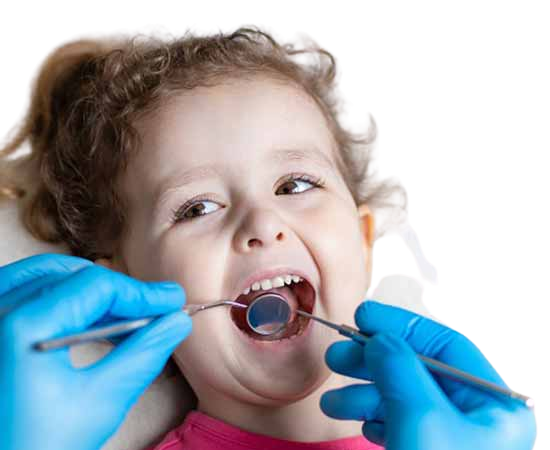Your Child’s First Dental Visit: What to Expect
When it comes to your child’s first dental visit, it’s normal to feel a mix of excitement and nerves. After all, this is a big milestone in their journey to lifelong oral health! You might wonder, “What will happen during the visit?” or “How can I help my child feel at ease?” The good news is that with a little preparation and the right guidance, this experience can be smooth and even enjoyable for both you and your child.
A child’s first dental visit is more than just a check-up; it’s a foundation for building healthy habits and ensuring their little teeth grow strong and healthy. Early dental visits also help children become comfortable with the dentist, making future visits stress-free. Let’s dive into what you can expect, how to prepare, and why starting early is one of the best gifts you can give your child.
Why Is the First Dental Visit Important?
Many parents assume dental visits aren’t necessary until all the baby teeth come in or when a problem arises. However, the truth is that your child should see the dentist as soon as their first tooth appears or by their first birthday – whichever comes first.
Here’s why this timing is crucial:
- Preventive Care: Early visits allow the dentist to check for any potential issues and offer advice on caring for your child’s teeth.
- Building Comfort: Familiarising your child with the dental environment early on reduces anxiety in the future.
- Healthy Habits Start Early: The dentist will guide you on brushing techniques, the importance of a balanced diet, and how to avoid tooth decay from habits like prolonged bottle use.
What to Expect During the First Visit
The first dental visit is typically short and designed to make your child feel safe and comfortable. Here’s an outline of what usually happens:
1. A Warm Welcome
Your child will be introduced to the dentist and staff in a friendly, relaxed manner. The goal here is to build trust and ensure your child feels at ease.
2. A Gentle Examination
The dentist will perform a quick check of your child’s teeth, gums, and jaw. They’ll look for signs of cavities, proper tooth development, and any early dental issues. Don’t worry – there’s no poking or prodding during this visit.
3. Parent Guidance
The dentist will talk to you about:
- Proper brushing and flossing techniques for your child’s age.
- Tips to prevent cavities, like limiting sugary snacks and drinks.
- Teething advice and how to manage discomfort.
- The importance of fluoride for strong, healthy teeth.
4. Time for Questions
This is your chance to ask anything on your mind – from teething troubles to when to start orthodontic checks. No question is too small!
Preparing Your Child for Their First Visit
A little preparation can go a long way in making the first dental appointment a positive experience. Here are some tips to help:
- Talk About It: Explain what the dentist does in a fun and simple way. You can say things like, “The dentist is a tooth doctor who will count your teeth and make sure they’re happy and healthy.”
- Role Play at Home: Pretend to be the dentist and let your child practice opening their mouth while you ‘check’ their teeth.
- Pick a Comfort Item: Let your child bring along their favourite toy or blanket for reassurance.
- Stay Positive: Avoid using words like “pain,” “hurt,” or “needle.” Instead, focus on the exciting parts of the visit.
- Read Books or Watch Videos: There are plenty of children’s books and cartoons about going to the dentist. These can make the idea less intimidating.
Tips for Parents During the Visit
Your role during the visit is crucial in helping your child feel calm and secure. Keep these tips in mind:
- Stay Calm: Children pick up on your emotions, so if you’re relaxed, they’re more likely to feel the same.
- Be Supportive: Sit close to your child or hold their hand if they need extra comfort.
- Praise Good Behaviour: Whether it’s sitting still or opening their mouth wide, let your child know they’re doing a great job!
Common Myths About Baby Teeth
There’s a lot of misinformation about baby teeth floating around. Let’s clear up some common myths:
- “Baby teeth don’t matter because they fall out.”
False! Baby teeth play a crucial role in helping your child chew, speak, and hold space for permanent teeth. Ignoring baby teeth can lead to problems with adult teeth later on. - “Cavities in baby teeth aren’t a big deal.”
Not true. Untreated cavities can cause pain, infection, and even affect the development of adult teeth.
After the Visit: Building Healthy Habits
Your child’s first dental visit is just the beginning. To ensure their smile stays healthy:
- Brush Twice a Day: Use a small amount of fluoride toothpaste and a soft-bristled toothbrush.
- Floss Daily: As soon as two teeth touch, start flossing gently.
- Limit Sugary Treats: Sticky snacks like candy and dried fruit are a common culprit for cavities.
- Stay Hydrated: Encourage water over sugary drinks to prevent tooth decay.
- Schedule Regular Check-ups: Aim for dental visits every six months to stay on top of your child’s oral health.
The Key to a Lifetime of Healthy Smiles
Your child’s first dental visit is an important step in their health journey, and it’s one that can set the tone for a lifetime of healthy smiles. By starting early, staying informed, and working together with your dentist, you’re giving your child the tools they need for excellent oral hygiene.
Remember, a positive first experience can make all the difference. So take the leap, schedule that appointment, and help your child build a bright, confident future.
Ready to Book Your Child’s First Dental Visit?
If you’re ready to take the next step, we’re here to help. Schedule your child’s first dental appointment today and let us guide you through this exciting milestone. Reach out to us to book a visit or to ask any questions – we’re happy to help!

How to Help Your Kids Overcome Fear of the Dentist
Does your child get anxious or fearful at the thought of going to the dentist? You’re not alone—many children experience fear when it comes to dental visits. As a parent, it can be disheartening to see your little one upset or scared, especially about something as important as their oral health. The good news? Dental fear is common and completely manageable with the right approach.
In this blog, we’ll walk you through practical and effective ways to help your child overcome their fear of the dentist. From preparation tips to in-clinic strategies, you’ll be equipped to make dental visits a positive and stress-free experience for your child.
Why Do Kids Fear the Dentist?
Understanding the root of your child’s fear is the first step in helping them overcome it. Common reasons for dental anxiety in children include:
- Fear of the Unknown: Many children don’t know what to expect during a dental visit, which can make them uneasy.
- Previous Negative Experience: A past dental visit that involved discomfort or stress can leave a lasting impression.
- Parental Influence: If children sense your anxiety about the dentist, they may mirror those feelings.
- Sensory Overload: The sights, sounds, and smells of a dental clinic can feel overwhelming.
- Fear of Pain: Even if they’ve never had a painful dental experience, kids may associate dentists with pain due to stories they’ve heard or media portrayals.
By recognising these triggers, you can address your child’s concerns with empathy and reassurance.
Practical Tips to Ease Dental Anxiety
Here are some tried-and-tested strategies to help your child feel more comfortable and confident about visiting the dentist:
1. Start Dental Visits Early
Introduce your child to the dentist early—ideally by their first birthday or when their first tooth appears. Early visits create familiarity and reduce the chances of fear developing later on. A child who grows up seeing the dentist regularly is more likely to view it as a normal part of life.
2. Be Positive in Your Communication
When talking to your child about the dentist, use positive and simple language. Avoid using words like “pain,” “needle,” or “drill.” Instead, describe the visit in a fun way, such as, “The dentist will count your teeth and make them shiny and clean.”
3. Role Play at Home
Turn dental visits into a game by role-playing at home. Pretend to be the dentist, and let your child take turns being the patient and the dentist. This playful activity can help them feel more comfortable with the idea of someone examining their teeth.
4. Choose a Child-Friendly Dentist
Look for a dentist who specialises in paediatric care. These professionals are trained to work with children and create a welcoming, stress-free environment. Many child-friendly clinics have colourful decor, toys, and activities to make the experience enjoyable.
5. Bring a Comfort Item
Let your child bring along their favourite toy, stuffed animal, or blanket to the appointment. Having something familiar nearby can help them feel secure.
6. Lead by Example
Children often look to their parents for cues. If you’re calm, relaxed, and positive about your own dental visits, your child is more likely to adopt the same attitude.
7. Read Books or Watch Videos
There are plenty of books and videos designed to prepare children for dental visits. These resources introduce the dentist in a fun and non-threatening way, helping your child understand what to expect.
8. Praise Their Efforts
Reward your child for their bravery, even if they’re still nervous. A small treat, sticker, or verbal praise can go a long way in building their confidence for future visits.
What to Do During the Dental Visit
Your child’s behaviour during the visit can often be influenced by how you handle the situation. Keep these tips in mind:
- Stay Calm and Supportive: If your child sees that you’re relaxed, they’re more likely to stay calm too. Offer gentle encouragement and remind them that they’re doing great.
- Let the Dentist Lead: Dentists who specialise in working with children know how to communicate effectively and build rapport. Give them the space to establish trust with your child.
- Stay Close but Not Overbearing: Sitting near your child can provide reassurance, but avoid hovering or jumping in unless the dentist asks for your input. This allows the dentist to connect with your child directly.
- Distract When Needed: If your child is getting fidgety or anxious, engage them in conversation or use distraction techniques like pointing out fun decor in the clinic.
Common Mistakes to Avoid
While your intentions are always in the right place, some actions can inadvertently increase your child’s fear. Here’s what to avoid:
- Bribing with Promises of Sweets: Offering candy or sugary treats as a reward can send mixed messages about the importance of dental health.
- Using the Dentist as a Threat: Statements like, “If you don’t brush, the dentist will pull out your teeth,” can create a negative association with dental visits.
- Dismissing Their Feelings: Saying things like, “There’s nothing to be scared of” might make your child feel their emotions are invalid. Instead, acknowledge their fears and reassure them with understanding.
When Fear Persists: Advanced Strategies
If your child’s fear of the dentist persists despite your efforts, consider these additional steps:
- Desensitisation Visits: Schedule a few visits where the dentist doesn’t perform any procedures but simply interacts with your child to build trust.
- Positive Reinforcement Charts: Create a reward chart for each successful dental visit, helping your child focus on their achievements.
- Professional Support: If anxiety is severe, consulting a child psychologist or therapist can provide techniques to manage their fear.
Building a Positive Relationship with Dental Care
Helping your child overcome their fear of the dentist is about more than just making visits stress-free—it’s about fostering a lifelong habit of prioritising oral health. When children associate dental care with positive experiences, they’re more likely to take good care of their teeth as they grow.
Final Thoughts
Remember, your role as a parent is crucial in shaping how your child perceives dental care. By starting early, staying positive, and working closely with a child-friendly dentist, you can help your little one overcome their fears and develop healthy habits for life.
If you’re ready to book your child’s next dental appointment or need more advice on managing dental anxiety, don’t hesitate to get in touch. Let’s work together to make every visit a happy and fearless one!
Vestibulum tempor elit ac tellus ornare luctus. Donec ultrices placerat elit id aliquam.
Preventing Cavities in Kids: Simple Tips for Healthier Smiles
As parents, we all want our children to grow up with bright, healthy smiles. But keeping cavities at bay in kids can sometimes feel like a constant battle, especially with sugary treats and snacks sneaking into their diets. The good news? Preventing cavities doesn’t have to be overwhelming. With a few simple habits and a bit of effort, you can set your child up for a lifetime of strong, healthy teeth.
In this blog, we’ll break down actionable, easy-to-follow tips to help you prevent cavities in your kids. These steps not only protect their teeth but also instil good oral hygiene practices that they’ll carry into adulthood.
Why Are Kids Prone to Cavities?
Cavities, or dental caries, happen when bacteria in the mouth produce acids that erode the tooth’s enamel. Children are particularly vulnerable to cavities for several reasons:
- Developing Teeth: Kids’ teeth are thinner and softer than adult teeth, making them more susceptible to decay.
- Snacking Habits: Frequent snacking on sugary or starchy foods provides a constant food source for cavity-causing bacteria.
- Inconsistent Brushing: Young children often struggle with proper brushing techniques or forget to brush altogether.
- Prolonged Bottle Use: Extended use of bottles, especially with milk or sugary drinks, can lead to “bottle tooth decay.”
Understanding these risk factors can help you make the necessary adjustments to keep your child’s teeth cavity-free.
Simple Tips to Prevent Cavities in Kids
Here are practical tips to help protect your child’s teeth and promote oral health:
1. Start Brushing Early
Begin brushing your child’s teeth as soon as their first tooth appears. Use a soft-bristled toothbrush and a rice-sized amount of fluoride toothpaste for children under three. Once they turn three, increase to a pea-sized amount.
2. Make Brushing Fun
Turn brushing into an enjoyable routine by:
- Using colourful toothbrushes with their favourite characters.
- Playing a two-minute song while they brush.
- Brushing alongside them to set an example and make it a family activity.
3. Don’t Skip Flossing
As soon as your child has two teeth that touch, introduce flossing into their routine. Flossing removes food particles and plaque from areas a toothbrush can’t reach, preventing cavities between teeth.
4. Limit Sugary Foods and Drinks
Excess sugar feeds harmful bacteria that cause cavities. Reduce the consumption of:
- Sweets like candy, chocolate, and sugary treats.
- Sticky snacks like dried fruits, which cling to teeth.
- Sugary beverages like sodas, fruit juices, and flavoured milk.
Encourage healthier alternatives like fresh fruits, vegetables, and water.
5. Practice Good Bottle Habits
If your child uses a bottle, avoid filling it with sugary drinks like juice or sweetened milk. Never let your child fall asleep with a bottle, as this can lead to prolonged sugar exposure on their teeth.
6. Encourage Water Over Sugary Drinks
Water, especially fluoridated water, is the best choice for your child’s teeth. It helps rinse away food particles, neutralises acid, and strengthens enamel.
7. Schedule Regular Dental Check-ups
Take your child to the dentist every six months for routine check-ups and cleanings. Regular visits allow the dentist to spot any early signs of decay and provide preventive treatments like fluoride applications or sealants.
8. Consider Dental Sealants
Sealants are thin, protective coatings applied to the chewing surfaces of back teeth, where cavities are most likely to form. They’re an excellent preventive measure for children.
9. Teach the “Two-Minute Rule”
Make sure your child brushes their teeth for a full two minutes twice a day. Setting a timer or using a brushing app can make this easier for them to follow.
10. Lead by Example
Kids often mimic their parents, so let them see you prioritising your own oral hygiene. Brush and floss together as a family to instil these habits.
How Diet Plays a Role in Cavity Prevention
What your child eats has a direct impact on their dental health. Here are some dietary tips to keep their teeth strong and healthy:
- Opt for Tooth-Friendly Snacks: Cheese, yoghurt, crunchy fruits (like apples), and vegetables (like carrots) help protect and strengthen teeth.
- Avoid Frequent Snacking: Grazing throughout the day keeps the mouth acidic, increasing the risk of cavities. Stick to regular meal and snack times.
- Limit Sticky Foods: Foods that stick to teeth, like gummies and dried fruits, are harder to clean off and increase the risk of decay.
- Encourage Fluoride: Fluoride strengthens enamel, making it more resistant to decay. Check if your water supply is fluoridated, and discuss fluoride treatments with your dentist if needed.
Signs Your Child May Have a Cavity
Even with the best prevention efforts, cavities can occasionally occur. Watch for these signs:
- Tooth sensitivity to hot, cold, or sweet foods.
- Visible white spots, brown spots, or holes on the teeth.
- Complaints of tooth pain.
- Swelling or redness around the gums near a specific tooth.
If you notice any of these signs, schedule a dental appointment as soon as possible to address the issue early.
Preventing Cavities Beyond Brushing
While brushing and flossing are essential, preventing cavities is about adopting a comprehensive approach. Make oral health a family priority, encourage your child to drink water regularly, and work with a trusted paediatric dentist to keep their teeth in top shape.
Final Thoughts
Preventing cavities in kids doesn’t have to be complicated. By establishing good oral hygiene habits, encouraging a tooth-friendly diet, and making regular dental check-ups a priority, you can set your child on the path to a lifetime of healthy smiles. Remember, these small steps today can make a big difference in their oral health tomorrow.
If you’re ready to ensure your child’s teeth stay strong and cavity-free, get in touch with us today to schedule a dental visit. Let’s work together to protect those precious little smiles!



